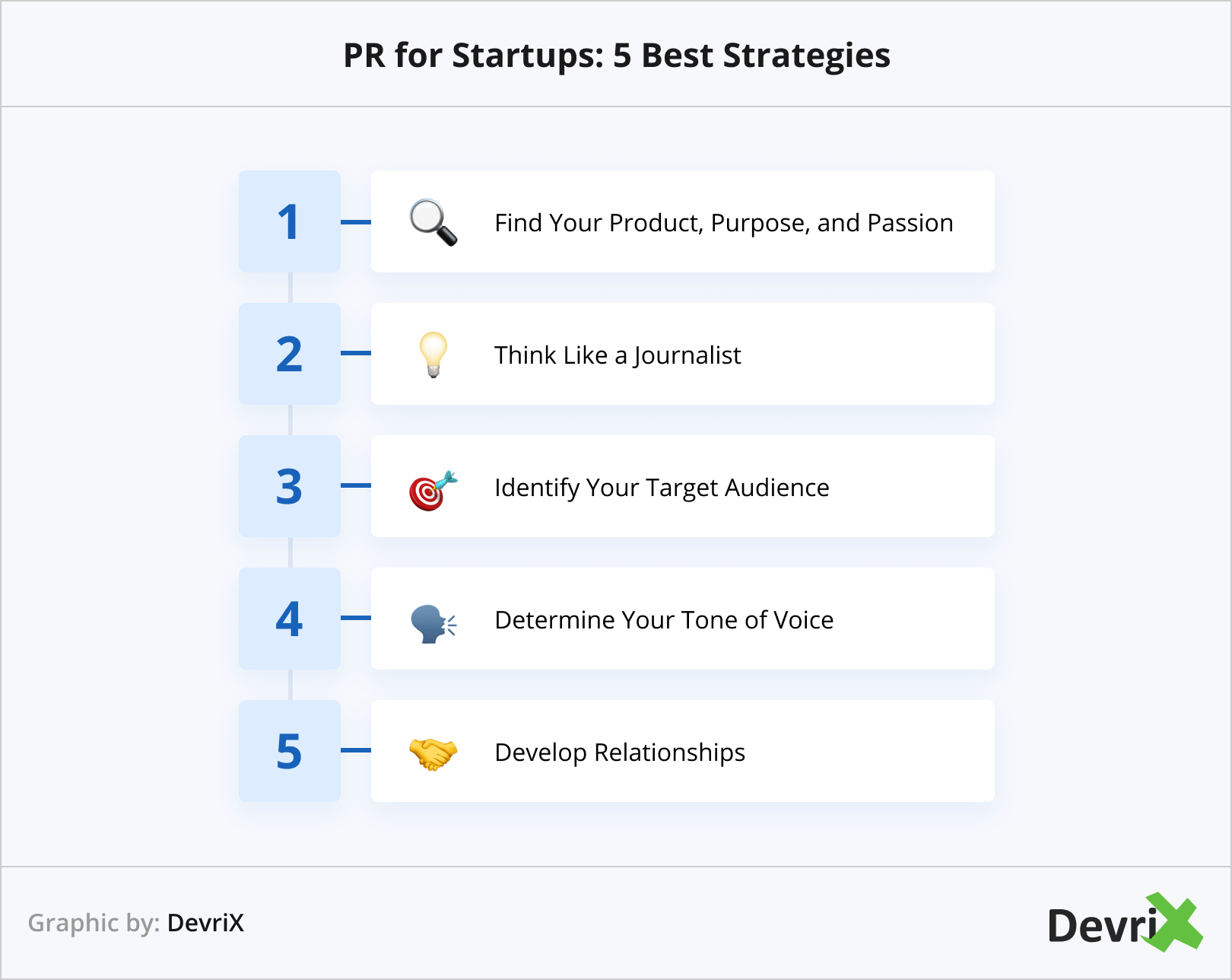Startups need to consider a lot of factors that could affect the success of their venture. From coming up with a great idea, to writing a business plan, they are all equally important.
Missing a step, or not giving it proper attention, may result in failure. And while you might think that gathering funds or building an MVP/prototype should be prioritized above everything, you should not underestimate the importance of public relations (PR).
You see, using PR for startups is one of the most effective methods to grow a business, and convert customers.
But when should you start doing PR, what are the best strategies? Well, if you are interested and no more, and have a few minutes, why not stay with us, and we can find the answers together?
Readers Also Enjoy: Supreme Startup Guide: Success From Start to Finish – DevriX
Why Do Startups Need PR?
Basically, public relations is a way to strategically use communications to grow your reputation, and develop the remarkability of your brand.
Now, while enterprises can also benefit from good PR, with startups it is even more important, since they are commonly not well-known by the public.
Of course, if you want your business to grow, you will need to make sure you become recognizable, and get people thinking about your brand.
However, chances are, the idea you have, and the product/service you intend to launch is not the only one on the market. So how do you stand out from the rest?
A successful startup PR consists of building a good media reputation, and brand image, which creates a public perception that your business is a leader in what it is doing.
Readers Also Enjoy: Building a Brand Identity: Essential Tips for Startups – DevriX
What Is the Best Time to Start a Startup PR Strategy?
As you know, timing is always crucial. It would not make much sense to commence your PR efforts in the early stages of your startup development. There would be no gain from such publicity, since you don’t really have a working product, or well-developed idea yet.
Instead, it would be much wiser to delve into public relations, once you begin working on your branding efforts. Ideally, you should be in a stage where you have clearly defined your vision, mission, and target audience.
Keep in mind that, if you are too late in starting your PR strategy, you will have missed out on tons of media exposure.
Readers Also Enjoy: How to Start a Tech Startup [Beginners Guide] – DevriX
PR for Startups: 5 Best Strategies

- Find Your Product, Purpose, and Passion
- Think Like a Journalist
- Identify Your Target Audience
- Determine Your Tone of Voice
- Develop Relationships
1. Find Your Product, Purpose, and Passion
Every PR pitch must obey the 3 P’s of PR storytelling: product, purpose, and passion.

- Product. You need to clearly define where your product or service stands in the market niche, and what it has to offer. The best way to achieve this is through competitive analysis.
- Purpose. Identify the purpose of your company – why are you doing, what you are doing? What sort of things does your product/service solve, and for whom? Remember that your company exists because of your users, so you need to perfectly know who they are, what they want, what they care about, etc.
- Passion. It is important to be able to convey the passion, vision, and culture of your startup to the world. Don’t forget that honesty is much more appreciated than pretending to be someone you are not.
All in all, following these, will greatly increase your startup PR success rate.
Readers Also Enjoy: The Role of Digital Marketing in Building a Better Brand Experience & PR Strategy – DevriX
2. Think Like a Journalist
Journalists and marketers are two different creatures. A great PR tip for startups is to try to think like a journalist, as doing so will significantly increase your chances of being featured in the news.
So, what do journalists think? Here are some examples:
- Is this story newsworthy? Even the most exciting startup or its ideas will typically not be deemed newsworthy. You need to think of something that will grab the public’s attention, and if you can think of a way to tie it to the story of your brand, even better.
- Is it new and relevant? Talking about a thing that was relevant 5 years ago will not catch the interest of journalists. You need something new, relevant, and interesting. Of course, you should be aware that what is “new” and “relevant” changes rather quickly.
- Are there facts or just opinions? Journalists do not care about your personal opinion, it sounds harsh, but it’s true. They are much more interested in facts and stats, so be prepared to share some figures and solid data. Otherwise, you risk losing their interest rather quickly.
- Is there something different here? There are tons of startups out there, how is yours different? Why should a journalist cover your story, and not someone else’s? Be prepared to share some unique insights, even if your product is similar to everyone else’s.
- Can I quote this? Journalists love strong, bold, and unique things. It makes them highly quotable. You don’t need to go full ‘Florida Man’, but saying something unusual will certainly help you get noticed.
- Are you honest? Fundamentally, good journalists are very good people – they want to bring justice, expose corruption, and make the world a better place. Keep in mind that they are also very good at telling whether you are honest or not. So, be honest and don’t try to be something you’re not. You might be a good liar, but sooner or later your lies will be exposed, and you will have forever lost their trust.
Readers Also Enjoy: Newsjacking: How to Benefit From Virality? [With Examples] – DevriX
3. Identify Your Target Audience
Your target audience will determine everything you do. Always keep them in mind, whether you are developing your PR, writing blog posts, or picking your pricing strategy.
The thing is that young companies often try to reach everyone, and by trying to do so, they typically reach no one. Avoid this mistake, and tailor your message accordingly to the audience you are most likely to resonate with.
The users you target should align with everything you stand for – your values, mission, communication, and so on.
Readers Also Enjoy: What Is Audience Analysis & Why Is It Crucial for Your Business? – DevriX
4. Determine Your Tone of Voice
Small business PR is not just about what you say, it is also important how you say it. Again, your brand’s tone of voice should take into consideration your audience – how they talk to each other, what words they use, do they like to make jokes, etc.
You have a much better chance of landing great PR materials and connecting with your audience, if you determine the proper tone of voice beforehand.
What’s more, if, for example, you use a serious tone of voice, and your users like to make jokes, and what-not, you will probably alienate them forever from your startup.
Also, your PR efforts will not be successful, no matter how much effort you put into them. In fact, they will be counterproductive, since your target audience will not speak the same language.
Readers Also Enjoy: Community Led Growth for Startups: Why, When and How? – DevriX
5. Develop Relationships
In journalism and PR, it’s all about developing long-term relationships that benefit both sides. Journalists are always happy to have trusted people in various positions and niches, so that they can always contact them, whenever the need arises.
Managing to win their trust will help you build a positive relationship. That’s one of the best PR tips for startups we can give you.
But how do you build rapport with journalists, you ask? These are some key points to remember:
- Always be concise and clear. Remember that journalists receive hundreds of emails every day, so you need to capture their attention.
- Show expertise and willingness to help. Sharing resources, knowledge, or helpful insights is what every journalist will appreciate. You can also offer value by connecting them with other relevant sources, or providing them with a different perspective to a story.
- Know what they like. Before contacting a journalist, you should do your best to research their preferences, beliefs, background, and so on. This will help you better understand what they are likely to cover, what angles they would like to see, etc. Also, it will let you know what stories NOT to pitch.
- Respect their preferences. Don’t be rude or aggressive, if a journalist turns you down. This will completely ruin your chances of ever developing a relationship with them. Instead, be respectful and polite. Apologize if you make a mistake, and offer an alternative where possible. Try to also be as cooperative and courteous as you can.
Readers Also Enjoy: What Is HARO, and How Can You Use It for Link Building? – DevriX
What Is Your Take on PR for Startups?
Public relations is a field full of possibilities. Startups, in particular, can truly benefit from the exposure media can bring to their brand. It lets people know who they are, what they can do, and why.
What do you think? Can PR for startups really be that beneficial to their overall success? Have you tried it for your own business? What were the results?
Your opinion matters – share it in the comments below.
![PR for Startups_ Why, When, How_ [Best Strategies]](https://devrix.com/wp-content/uploads/2023/08/PR-for-Startups_-Why-When-How_-Best-Strategies-810x340.png)



